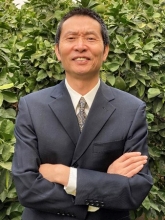MSE 298 Seminar (Zoom): Strength Scaling Behavior in Nanocrystalline-Nanotwinned and Additively Manufactured Metals

Professor
Department of Materials Science and Engineering
UCLA
Zoom: Meeting ID 928 7114 0676, Passcode 057979
Abstract: A material strength is known to be dictated by the underlying microstructural length scale, which can be quite complex and difficult to interpret. This talk will discuss the strengthening behavior in two different types of materials. The first type is called nanocrystalline-nanotwinned metals, formed at the intersection of nanocrystalline and nanotwinned materials. Our experimental results demonstrate that these materials are extremely strong but can exhibit complex Hall-Petch strengthening and softening behavior. We discuss the origins of Hall-Petch softening and show that dopant at trace amounts can be selected to control and extend Hall-Petch strengthening behavior down to a few nanometers.
In additively manufactured metals, we will use laser powder-bed-fusion (L-PBF) 316L stainless steel as an example. With optimized laser processing parameters, we show that these materials can exhibit a combination of yield strength and tensile ductility that well surpasses that of conventional 316L stainless steels. The strengthening behavior here arises from multiple mechanisms, including solidification cellular structures, low-angle grain boundaries, dislocations, and precipitates, with length scales spanning nearly six orders of magnitude. In addition, solute segregation along cellular walls can enhance dislocation pinning and promote twinning. Due to the residual stresses, appreciable tension–compression asymmetries in yield strength and work hardening disparities were observed for as-printed materials. We thus contend that no single strengthen-scaling law can be applicable to these additively manufactured alloys.
Bio: Yinmin (Morris) Wang is a professor of Materials Science and Engineering at UCLA. Before joining UCLA in 2020, Wang was a permanent staff scientist and a deputy group leader at Lawrence Livermore National Laboratory (Livermore, California), where he joined as the inaugural recipient of Harold Graboske Fellowship in 2004, after obtaining his Ph.D. and two master’s degrees, all from the Johns Hopkins University. His group research interest covers the structure-property relationship of nanocrystalline and nanotwinned metals, additive manufacturing, lithium-ion batteries, and fusion energy materials. Wang is a fellow of the American Physical Society (2014 class) and a winner of several prestigious awards, including Nano50 Innovator Award (2008) and Frost & Sullivan Emerging Technology of the Year Award (2006). He has published extensively in the above areas and has served as an editorial board member of Scientific Report (2017-2020).
Share
Upcoming Events
-
MAE 298 SEMINAR: Technology Developments for FIR Bolometric Detector Focal Plane Assemblies
-
CBE 298 Seminar: The Wisdom of the Crowd: Watching Bacterial Collectives (Re)shape Themselves
-
CEE Seminar: BIM and the Digital Twin
-
MSE Special Seminar: Revolutionizing Battery Technology - Engineering Quantum Materials for Enhanced Safety and Performance in Solid Electrolytes
-
MSE Special Seminar: Designing Sustainable Soft Matter from the Molecule Up
